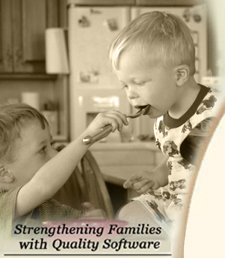
|
So What's the BIG Deal About Bamboo?
by Alice Osborne
 Bamboo is showing up everywhere: clothing (T-shirts, crew socks, yoga pants, pajamas), flooring, countertops, and kitchen cutting boards. And, there actually IS a big deal about this resource.
Let’s look at it with a special focus on kitchen cutting boards—they’re becoming quite popular. But how do they stack up compared to traditional hardwood boards, or plastic ones?
Lets start with the plant itself:
 Bamboo is highly sustainable. Some varieties can grow up to two feet per day, and ready diameters of 120 foot around. Bamboo is a grass, which means that it propagates itself by sending out new shoots underground. This means that it does not need to be replanted. Bamboo is highly sustainable. Some varieties can grow up to two feet per day, and ready diameters of 120 foot around. Bamboo is a grass, which means that it propagates itself by sending out new shoots underground. This means that it does not need to be replanted.
The varieties of bamboo used to make cutting boards are generally not from the habitats of the giant panda. Chalk up one more for environmental strengths.
Bamboo is 16% harder than hard maple, a wood commonly used to make cutting boards.
Due to it's hardness, bamboo is less porous than hardwoods. It soaks up less water, and thus it soaks up less bacteria.
Bamboo cutting boards are made up of small pieces of bamboo glued together, meaning that construction quality is important, as is choosing a board made from formaldehyde-free glue. Formaldehyde is nasty. Luckily, anything that has the 'non-toxic' label will not have formaldehydes.
Not too bad. Sounds pretty good so far. But how do bamboo cutting boards perform? According to researchers and kitchen-testers, pretty darn well.
As with any wooden cutting board, you have to be careful not to soak it in water for too long, otherwise it will swell (though it doesn't swell as easily as most hardwoods). The hardness of bamboo means that it will wear well (and is hard to scar with a knife) while at the same time being soft enough not to damage or blunt your knife, unlike glass and some polymer boards.
While bamboo doesn't clean up as easily as a plastic board (which can be thrown in the dishwasher) they do look a lot better. Furthermore, bamboo still beats out plastics in terms of how well it wears.
Bamboo's porosity means that they hold very little moisture. Humid environments can foster problems with hardwood boards growing bacteria and mold (ew!). Bamboo doesn’t seem to do this.
Care is easy. Mineral oil can be used on bamboo to help retain waterproofing, luster, and looks. While on the cleaning side of things, bamboo is as easy to take care of as hardwood.
If you’re convinced a bamboo board might be a good replacement when your current board bites the dust, here are a few online sources:
Bamboo Cutting Boards
Many sizes, styles and woods. Factory direct pricing:
www.tumbleweedwoodworks.com, www.shopzilla.com, www.customcuttingboards.com, www.toolboxtales.com
Bamboo Cheese Slicers
CheeseSlicing.com
Contribute to the Cook'n Club!
DVO would love to publish your article, prose, photography and art as well as your cooking, kitchen and nutrition tips, tricks and secrets. Visit the Newsletter Submission / Win Win for All section in our Forum for more information and details.
|
|


